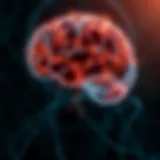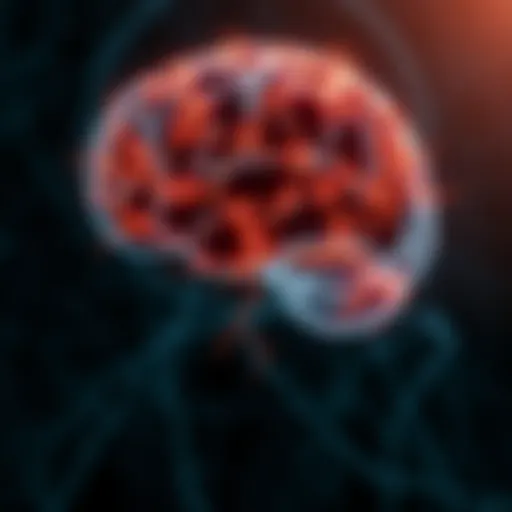Exploring NPD Therapy: Effective Strategies and Insights


Intro
Navigating the intricacies of mental health can feel like trying to find a needle in a haystack, especially when it comes to understanding disorders like Narcissistic Personality Disorder (NPD). In recent years, there has been a growing interest in NPD therapy and its potential to create meaningful change in the lives of individuals affected by this complex condition. This article delves into the various therapeutic approaches available for NPD, alongside insights into the impact of this disorder on interpersonal relationships and social dynamics. By shedding light on these aspects, we hope to offer a roadmap for both clinicians and individuals seeking to manage NPD with skill and empathy.
Understanding Mental Health and Well-being
What is Mental Health?
Mental health refers to our emotional, psychological, and social well-being. It's not just about the absence of mental illness but encompasses our ability to cope with stress, relate to others, and make decisions. It's akin to checking the oil in your car; if neglected, the engine won't run smoothly. Mental health influences how we think, feel, and act, framing our daily experiences and interactions.
The Importance of Prioritizing Mental Well-being
Prioritizing mental well-being is crucial for living a balanced, fulfilling life. When individuals invest in their mental health, they often find increased resilience, enhanced emotional regulation, and a more robust ability to forge healthy relationships. Just like watering a plant regularly helps it thrive, regular attention to mental well-being cultivates personal growth.
Common Mental Health Challenges and Disorders
While numerous mental health challenges exist, some stand out due to their prevalence and impact. Conditions such as depression, anxiety, and, of course, personality disorders like NPD can significantly affect an individual’s life. Addressing these issues requires a nuanced understanding. People experiencing NPD might struggle to empathize with others, which can create a rift in their relationships. Recognizing these patterns is the first step toward effective therapy.
Strategies for Improving Mental Health
Self-care Techniques and Practices
Self-care is not merely a trendy phrase but an essential part of maintaining mental health. Simple practices like journaling, engaging in hobbies, or taking quiet moments for oneself can foster a better emotional landscape. Here are some self-care strategies:
- Maintain a routine with regular sleep and meal times.
- Engage in physical activities, even a short walk can refresh the mind.
- Set aside time for relaxation and mindfulness every day.
Building Resilience and Stress Management
Building emotional resilience is crucial. It involves developing coping mechanisms to handle life’s ups and downs. Techniques such as cognitive-behavioral strategies can be instrumental. They help individuals reframe negative thoughts, fostering a more balanced outlook on life.
Seeking Professional Help: Therapy and Counseling
It's no secret that professional help can make a world of difference. Therapists specializing in NPD can provide tailored strategies that alleviate symptoms and enhance personal growth. However, faced with the stigma around mental health, many might hesitate to seek help. Thus, normalizing therapy is paramount in encouraging individuals to take that essential first step.
Finding Balance in Life
Healthy Lifestyle Choices: Diet, Exercise, and Sleep
Diet, exercise, and sleep are foundational to cognitive function and emotional stability. Consuming a balanced diet rich in nutrients while ensuring adequate physical activity can lead to improved mood and overall mental health. Sleep, often overlooked, plays a vital role in mental well-being; it's during sleep that our brains process emotions and recharge for the day ahead.
Mindfulness and Meditation Practices
Mindfulness and meditation are increasingly recognized for their benefits in managing stress and enhancing emotional regulation. Such practices encourage individuals to observe their thoughts without judgment, leading to greater self-awareness and healthier coping strategies.
Setting Boundaries and Managing Time Effectively
Establishing boundaries in relationships and effectively managing time are also critical for mental health. Learning to say 'no' when necessary, and carving out time for activities that rejuvenate the spirit can create a healthier emotional ecosystem.
Enhancing Personal Development
Goal Setting and Productivity Tips
Setting realistic, achievable goals is vital for personal development. Breaking large objectives into smaller, manageable steps prevents feelings of overwhelm and fosters a sense of accomplishment. Tools such as planners or productivity apps can be quite beneficial.
Building Healthy Relationships and Social Connections
Healthy, supportive relationships play a pivotal role in mental health. They offer comfort, understanding, and community. Cultivating connections with compassionate individuals can greatly impact an individual’s path toward recovery from NPD.
Practicing Gratitude and Positivity
"> Practicing gratitude can shift focus from what's lacking to recognizing the positives in daily life. Journaling about things to be grateful for, no matter how small, cultivates an atmosphere of positivity that permeates other areas of life.
Tips for Maintaining Mental Well-being
Strategies for Preventing Burnout


Burnout can sneak up on anyone, especially individuals dealing with the weight of NPD. Setting realistic expectations for oneself and taking regular breaks is essential in prevention.
Coping with Challenges and Setbacks
Understanding that setbacks are part of the journey can reduce anxiety about failures. Adapting a mindset of learning from challenges rather than fearing them enables continued growth.
Creating a Supportive Environment
Lastly, surrounding oneself with positivity and support is key. This could be through engaging with understanding friends or even seeking online communities where individuals share common experiences. These environments can serve as key pillars in the journey towards mental wellness.
By examining these various facets of NPD therapy and mental wellness, readers can gain meaningful insight into the landscape of mental health. The road to understanding and healing is multifaceted but undoubtedly essential.
Intro to Narcissistic Personality Disorder
Narcissistic Personality Disorder (NPD) is often a misunderstood psychological condition, defined by an excessive focus on oneself, interwoven with a need for admiration and a lack of empathy for others. This article seeks to peel back the layers of NPD, diving into its definition, symptoms, and impact on relationships. Understanding NPD is crucial not just for clinicians aiming to provide effective treatment, but also for individuals who are grappling with the intricacies of their own behaviors. Furthermore, it permits families and friends to better support loved ones who may be affected.
This section is fundamental because it sets the stage for the subsequent discussions around therapy and management strategies. NPD can manifest in various ways, altering interpersonal dynamics and causing disruptions in both personal and professional relationships. By providing clarity on what NPD entails, we equip readers with the language and context to engage meaningfully with the subject, enhancing their grasp of the therapeutic approaches that will be examined later on.
Defining NPD
Narcissistic Personality Disorder is characterized by a pervasive pattern of grandiosity, a constant need for admiration, and a significant lack of empathy. It’s like a facade; on the outside, individuals may appear confident, even charismatic, but deep down, insecurities can linger, often driving their behavior. The criteria for diagnosing NPD, according to the DSM-5, include:
- A grandiose sense of self-importance, accentuating achievements or talents.
- A preoccupation with fantasies of unlimited success, power, or brilliance.
- Believing they are special or unique and can only be understood by, or should associate with, high-status individuals.
- Requiring excessive admiration from others.
- A strong sense of entitlement, expecting special treatment or compliance with their demands.
- Exploitative behavior in relationships, taking advantage of others to achieve their own ends.
- Lack of empathy, finding it difficult to recognize or identify with the feelings and needs of others.
- Often being envious of others or believing others are envious of them.
- Displaying arrogant, haughty behaviors or attitudes.
Defining NPD provides clarity for both those experiencing its impact and the professionals working to address these issues. Knowing the symptoms can be the first step toward meaningful change.
Prevalence and Demographics
Narcissistic Personality Disorder does not discriminate; it affects individuals across all walks of life. However, studies suggest a prevalence rate of approximately 1% to 6% in the general population. Its occurrence is more frequently reported in males than females, with estimates suggesting about 50% of the cases diagnosed are men. This disparity in diagnosis could relate to societal expectations; men might exhibit more overt narcissistic traits than women, who could display their narcissism in more subtle ways, making detection trickier.
Various factors contribute to the development of NPD, including genetic predispositions and environmental influences such as parenting styles. Children who receive too much praise or, conversely, too much criticism may develop narcissistic traits as coping mechanisms. Understanding these demographics can shine a light on treatment considerations—tailoring therapeutic interventions to fit the affected demographic’s specific needs.
"To comprehend Narcissistic Personality Disorder, one must delve into not just the individual but the backdrop of their experiences and relationships"
The Role of Therapy in Managing NPD
Understanding Narcissistic Personality Disorder (NPD) is a multi-faceted endeavor that requires careful navigation through the intricacies of human psyche and behavior. Therapy plays a pivotal role in this management process, enabling individuals with NPD to recognize and confront their behaviors while fostering a nurturing path toward self-awareness and growth.
Therapeutic interventions can help individuals forge healthier connections with others as they work through their emotional challenges. This process offers a structured experience, equipping them with essential tools to manage their symptoms effectively. It’s important to note that therapy isn’t a magic wand; it often requires time, dedication, and a willingness to engage deeply in self-exploration.
Types of Therapeutic Approaches
There isn’t a one-size-fits-all approach to treating NPD. Each therapeutic method comes with its strengths and weaknesses. Here’s a deeper dive into some popular techniques:
Psychodynamic Therapy
Psychodynamic therapy delves into the unconscious motives that shape human behavior. This method is rooted in the premise that many issues wrestled with in adulthood are born from childhood experiences.
A key characteristic of this therapy is its emphasis on insight—which means understanding one’s own thoughts and feelings more clearly. This approach can reveal patterns in relationships and behaviors that previously went unnoticed. Its deep exploration of emotions makes it a powerful avenue for those dealing with the layers of NPD.
While psychodynamic therapy can lead to profound insights, it does have its disadvantages. Some clients may find the deep dive into their past overwhelming, and the process can be lengthy, requiring commitment and patience.
Cognitive Behavioral Therapy
Cognitive Behavioral Therapy (CBT) is often highlighted for its structured approach to managing thought patterns and behaviors. The beauty of CBT lies in its practicality—it provides tangible skills to help individuals identify and reframe negative thinking.
It focuses on the here-and-now, which can be substantially beneficial for those affected by NPD. One of its defining features is the creation of a collaborative relationship between therapist and client, allowing for an open exchange focused on problem-solving.
Nevertheless, CBT can fall short in addressing deeper emotional wounds that may not surface through cognitive strategies alone. Individuals may struggle to reconcile their immediate feelings with longstanding psychological patterns that CBT tends to overlook.
Schema Therapy
Schema therapy stands out by integrating elements of cognitive, behavioral, and psychodynamic therapies into a cohesive framework. This approach targets deeply held beliefs or
Challenges in NPD Treatment
Narcissistic Personality Disorder presents numerous hurdles that complicate effective treatment. Understanding these challenges is vital for both practitioners and patients. NPD can skew perceptions and reactions, creating a web of intricacies that demand shrewd intervention. It's not just about addressing the overt symptoms; it’s about navigating through the underlying mechanisms that fuel these behaviors.


Resistance to Change
One of the most formidable barriers in treating NPD is resistance to change. Individuals with NPD often view their behaviors as integral to their self-identity. Acknowledging a need for change can feel like shaking the very ground beneath their feet. They might display defensiveness or hostility during therapy sessions, perceiving the process as a personal attack rather than a healing journey.
Why Resistance Occurs
- The self-image of someone with NPD is typically inflated, making it hard to accept any notions of inadequacy or need for improvement.
- Change might pose threats to the stability of their relationships, prompting a knee-jerk reaction to reject new ideas.
Therapists need to tackle this reluctance with patience and consistent frameworks, creating a safe environment where patients are encouraged to explore vulnerabilities without feeling exposed. For example, introducing change gradually, using gentle prompts can help ease these defenses.
"Change is like a slow dance; you can’t rush it without risking a stumble."
Therapeutic Alliance
Building a strong therapeutic alliance is key in the treatment of NPD. The relationship between therapist and patient is a significant predictor of treatment success. Given the nature of narcissism, where individuals often struggle to trust others, establishing this rapport can be particularly complex.
Factors Affecting the Alliance
- Empathy and Trust: Patients with NPD may distrust the intentions of the therapist, fearing judgment or criticism.
- Dependence vs. Independence: Striking a balance between encouraging independence while being supportive can be tricky.
A strong alliance is cultivated through consistent communication and transparency. Therapists should express genuine interest in their patients' narratives, even if such stories might come peppered with grandiosity. Acknowledging both achievements and shortcomings helps to reinforce this connection.
Individual Variability
Finally, addressing individual variability is a crucial consideration in the treatment landscape for NPD. No two individuals with NPD are exactly alike; their backgrounds, reasons for developing narcissistic traits, and coping mechanisms can vary significantly.
Implications of Variability
- Different Triggers: The triggers that lead to narcissistic behaviors can differ based on personal history, societal influences, or emotional traumas.
- Customizable Treatment Plans: Treatment approaches should be tailored not just to the disorder but to the nuances of each individual.
Flexibility in treatment strategies is paramount. What might resonate with one patient could dismay another. Regularly assessing progress and adapting techniques can cater to these differences, ensuring a more holistic and effective therapeutic experience.
Therapeutic Techniques for NPD
Therapeutic techniques play a pivotal role in the management of Narcissistic Personality Disorder (NPD). These methods provide a structured framework that helps individuals navigate their self-centered tendencies and encourages introspection. Not every technique suits every individual, so understanding the variety available is essential. Engaging in tailored therapeutic techniques fosters personal growth and healthier interactions while promoting self-awareness. Here’s a closer look at several key techniques used in therapy for NPD.
Self-Reflection Exercises
Self-reflection exercises serve as foundational tools in the therapeutic journey for individuals with NPD. This approach encourages clients to turn their focus inward, prompting them to examine their thoughts, feelings, and behaviors closely. The idea is to cultivate a deeper understanding of their impact on themselves and those around them.
- Journaling: Writing about daily experiences can reveal patterns in behavior. It’s like holding up a mirror that reflects not only the good but the not-so-good aspects of oneself.
- Guided Imagery: This technique allows individuals to visualize scenarios where their actions may inadvertently harm others. It opens the door to empathy, a concept often shunned in narcissistic traits.
- Feedback Solicitation: Encourage individuals to request constructive feedback from trusted friends or family members. This act can be a hard step, but it is crucial for understanding others' perspectives.
Consider that self-reflection isn’t just a navel-gazing exercise. It's more like peeling an onion; layers seem tough initially but uncover much beneath the skin. Through these methods, individuals can begin to confront uncomfortable truths that have long been insulated by a protective shell.
Mindfulness Practices
Mindfulness practices complement self-reflection by bringing awareness to the present moment—an element often overlooked by individuals with NPD. Those struggling with this disorder frequently find themselves ruminating over past grievances or worrying excessively about future perceived slights. Mindfulness can provide a welcome reprieve from this cycle.
- Meditation: Simply sitting quietly and focusing on one’s breath can ground an individual, breaking the cycle of incessant self-centered thoughts.
- Body Scan: This practice involves mentally scanning the body, fostering bodily awareness while helping people distinguish between emotional and physical sensations.
- Mindful Listening: When in conversation, focusing entirely on what the other person is saying—not just preparing to respond—can dramatically improve interpersonal relationships.
Mindfulness is like a breath of fresh air in a stuffy room; it clears out the chaos, opening space for clarity and understanding. For someone with NPD, the ability to remain present can shift the focus from self to others, fostering healthier interactions.
Role-Playing and Feedback
Role-playing serves as a dynamic component of therapy, allowing individuals with NPD to practice new behaviors in a safe environment. This technique helps in bridging the gap between theoretical knowledge and real-world applicability.
- Client-Therapist Role Play: The therapist may take on a role that the client has difficulty engaging with, such as a family member or colleague. This practice allows the client to see how their behavior may come off to others, offering ripe opportunities for feedback.
- Peer Feedback Sessions: Sometimes, support groups can facilitate role-playing exercises where individuals enact scenarios they struggle with. This fosters a collective learning experience.
- Feedback Loops: After role-playing, providing and receiving constructive criticism becomes critical. Understanding the effects of one's actions and words, particularly in a controlled setting, encourages growth.
Role-playing is akin to rehearsing a play; it allows individuals to step outside themselves, gaining relevant insights into how their behaviors could change. This nurturing setup can spark those proverbial lightbulbs of realization, pushing one towards substantial behavior modifications.
These therapeutic techniques collectively build a nuanced approach to managing NPD, assisting individuals in deepening their awareness and promoting healthier connections in their daily lives.
Through the integration of self-reflection exercises, mindfulness practices, and role-playing, therapists can help clients address the complexities of NPD and facilitate transformative learning experiences, ultimately contributing to a more fulfilling existence in relationships and other social environments.
Impact of NPD on Relationships


Understanding the impact of Narcissistic Personality Disorder (NPD) on relationships is crucial. This aspect sheds light on how a person's interpersonal style can create ripples that affect not only their lives but also the lives of those around them. The patterns associated with NPD often lead to complex and, at times, tumultuous interactions. Recognizing this is the first step towards fostering healthier connections.
Interpersonal Dynamics
NPD significantly influences interpersonal dynamics. Individuals with NPD often present an inflated sense of self-importance and a lack of empathy. Consequently, this can lead to imbalanced relationships where the needs of the narcissist take precedence. The dynamics become particularly complicated when others involved attempt to meet these demands, often leading to feelings of inadequacy or neglect.
- Manipulation and Control: Narcissists may use charming behaviors to reel others in, only to later withdraw affection and validation, creating a cycle of confusion.
- Expectations: They might expect others to cater to their emotional needs without reciprocating. This imbalance often leads to resentment.
- Conflict: Disagreements can escalate quickly, as the narcissist may react defensively to perceived criticisms, resulting in further strain on relationships.
These interpersonal dynamics can create a toxic environment not only for friends and partners but also for themselves. Over time, it can cause a serious erosion of trust and intimacy, which is essential for any meaningful connection.
Family and Friends
Among family and friends, the detrimental impact of NPD can be even more pronounced. Close relationships are often marked by conflict and misunderstanding. Lacking empathy makes it particularly challenging for those with NPD to connect on an emotional level.
- Family Ties: Family members might feel a constant need to validate the narcissist’s feelings while their own needs go unchecked. Such a scenario creates rifts, misunderstandings, and often deep emotional pain.
- Friendship Strain: Friends may find themselves feeling used or underappreciated. As time passes, some may distance themselves, further isolating the individual with NPD and reinforcing their sense of abandonment, which often triggers negative coping mechanisms.
The strain on family and friendships can also lead to a cycle of dysfunction. Those directly interacting with the individual may eventually display similar patterns of narcissistic behavior or may develop an unhealthy dependency. Understanding these dynamics is vital to break the cycle and promote healing.
Workplace Interactions
NPD’s impact extends into the workplace where it can create a challenging atmosphere. In professional settings, individuals with NPD may dominate discussions, undermine colleagues, or take excessive credit for teamwork. This approach can create tension within teams and lead to a hostile work environment.
- Leadership Styles: Narcissistic leaders might seem charismatic at first, but their inability to take constructive feedback can stall team growth.
- Team Dynamics: Colleagues may experience frustration due to the lack of collaboration, leading to decreased morale and heightened stress, affecting overall productivity.
- Career Implications: Over time, individuals with NPD may find themselves struggling to advance due to interpersonal conflict, which can overshadow their professional capabilities.
Acknowledging the influence of NPD on these various relationships provides a foundation for understanding the need for tailored therapeutic approaches. Addressing interpersonal and relational challenges is crucial for fostering healthier connections and personal growth in individuals with NPD.
In summary, the impact of NPD on relationships cannot be understated. By comprehensively understanding these dynamics—spanning interpersonal interactions, familial bonds, and workplace dynamics—individuals can better navigate the complexities inherent in relationships affected by narcissistic traits. Identifying these issues not only helps individuals with NPD but also offers essential insights for those around them.
The Prognosis for Individuals with NPD
Understanding the prognosis for individuals with Narcissistic Personality Disorder (NPD) is crucial for anyone involved in therapy or management of this condition. Prognosis delves into the potential long-term outcomes and possibilities for change, serving as a guiding light for therapists and individuals navigating this complex landscape. It is not merely about whether a person can 'get better' but also encompasses various aspects, including the evolution of personality traits and the quality of interpersonal relationships over time. Each person’s journey through NPD varies significantly, influenced by therapy engagement, personal motivations, and social support systems.
Long-Term Outcomes
The long-term outcomes for individuals with NPD can be quite mixed, and understanding these outcomes is pivotal for both clients and therapists. Many studies suggest that some individuals experience gradual improvements over time, particularly when they undergo consistent therapeutic intervention. This is often characterized by greater emotional regulation and enhanced interpersonal dynamics. Conversely, some might find themselves trapped in cycles of unhealthy behavior, repeating the same dysfunctional patterns throughout their lives.
Factors influencing long-term outcomes can include:
- Therapeutic Engagement: Individuals who actively participate in their therapy tend to show more progress.
- Support Systems: A stable, understanding social network can significantly facilitate change.
- Comorbid Conditions: Often, there are underlying issues like depression or anxiety that can complicate the prognosis.
- Motivation for Change: Willingness to self-reflect and accept guidance can highly influence personal development.
"Treatment is like a marathon, not a sprint; some may reach the finish line sooner, while others might take different paths along the way."
Potential for Change
The potential for change in individuals with NPD is a topic of ongoing debate among professionals in the field. Research suggests that while the traits associated with narcissism may be deeply ingrained, change is indeed possible over the long haul. This is especially true when specific therapeutic techniques are employed to foster self-awareness, empathy, and healthier coping mechanisms.
Considerations around potential for change include:
- Tailored Therapeutic Approaches: Customized therapy plans that cater to an individual's unique traits and life experiences often yield better results.
- Skill Development: Therapy focusing on interpersonal skills and empathy can gradually promote healthier interactions and self-perception.
- Time and Patience: Changing long-standing behaviors and thought patterns is a time-consuming process, requiring perseverance from both the therapist and the individual.
- Setbacks: Regressions may occur, but these should be viewed as part of the learning process and not as failures.
In summary, while the prognosis for individuals with Narcissistic Personality Disorder presents significant challenges, it also opens the door to possibilities for growth and transformation. Emphasizing a personalized approach to therapy, fostering support networks, and encouraging self-exploration can pave the way for meaningful change.
Ending
In summation, the field of Narcissistic Personality Disorder (NPD) therapy presents both remarkable challenges and pivotal opportunities for progress. Understanding the complexity of NPD not only enlightens practitioners but also brings hope to individuals affected by this often-misunderstood condition. This article has dissected various therapeutic approaches, illuminated the barriers in treatment, and provided insights into long-term outcomes and relationship implications.
Summary of Key Points
- Therapeutic Approaches: We examined multiple modalities including Psychodynamic Therapy, Cognitive Behavioral Therapy, and Schema Therapy. Each method offers unique techniques that can resonate differently with individuals based on their personal histories and psychological frameworks.
- Challenges Implemented: Resistance to change is a common hurdle for those with NPD, often stemming from their need to preserve a distorted self-image. The therapeutic relationship forms a crucial alliance that must be nurtured to allow for effective confrontation of these challenges.
- Long-Term Prognosis: While NPD carries a reputation of being difficult to treat, realistic hope lies in understanding that change is possible. The potential for individuals to foster empathy and healthier relationships embodies the very essence of this therapy's aim.
Future Directions in NPD Therapy
The landscape of NPD treatment is ever-evolving, and several future directions hold promise:
- Integration of Technology: Online therapy platforms and mental health apps could provide innovative tools for self-reflection and practice.
- Continued Research: It is crucial that the psychological community invests in ongoing studies to refine therapeutic techniques. Greater understanding of the neural correlates of narcissism is essential for customized interventions.
- Holistic Approaches: Future therapies may benefit from incorporating holistic strategies, including mindfulness and physical wellness, which can influence mental health positively.
- Educational Programs: Educating the community about NPD and its impact can foster healthier interpersonal dynamics and mutual understanding.
As we conclude, it is essential to view NPD therapy not as a struggle but as a journey through a complex landscape. The insights gained from this exploration equip both therapists and individuals with the tools necessary to facilitate personal growth and enriched relationships. By fostering an environment of understanding and tailored treatment, we can pave the way for healthier interactions.
“The strongest river of change flows from understanding.”
For more resources, consider visiting:
- Wikipedia on Narcissistic Personality Disorder
- Britannica on Personality Disorders
- r/NarcissisticAbuse subreddit
- National Institute of Mental Health
- American Psychological Association















